Mythological tales reveal the flaws in The Frightener's plot structure
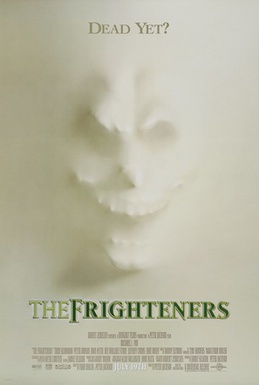
-
Est. vs Actual domestic box office revenue
$14-18MM/ $16MM - Five mythological tales reveal the invisible plot structure
The Frighteners is a 1996 supernatural comedy film directed by Peter Jackson and co-written with Fran Walsh. The story follows a conman who uses his psychic abilities to overcome a demonic spirit. The story explores basic human desires of honour, power, accumulation & vengeance. Mythosis uses 5 mythological tales to extract the plot structure of the movie.
1. Mythological tales reveal the invisible plot structure of any story
1A. 90% of the events are borrowed from 5 mythological tales
Frank's quest is driven by the desire to own and mirrors the tale of Valmiki from Hindu mythology. Both Valmiki & Frank give up their selfish endeavours to help others.
Lucy’s quest is driven by the desire to serve one’s clan or order and mirrors the tale of Hanuman from Hindu mythology. Both Hanuman & Lucy loyally serve a person fighting a social evil. The latter half of Hanuman’s quest is mirrored by Frank.
Johnny’s quest is driven by the desire to dominate others and mirrors the tale of Ravan from Hindu mythology. Both Ravan & Johnny are left to die by their envious brothers.
Every human desire has two quests - a fulfilled one and also an unfulfilled one. The Frighteners uses both quests for the desire to dominate others. Patricia mirrors part of the fulfilled quest whereas Johnny mirrors the unfulfilled quest.
Patricia’s quest is driven by the desire to dominate others and mirrors the tale of Circe from Greek mythology. Both Circe & Patricia create a façade to dupe others.
Dammers’ quest is driven by the desire to punish offenders and mirrors the tale of Duryodhan from Hindu mythology. Both Duryodhan & Dammers pursue wrongdoers to avenge themselves. Ray has an underdeveloped quest driven by the desire to protect loved ones.
Detailed mirroring of each character to their respective mythological tales is in section “Unlocking the Ideal Plot Structure”
Lucy’s quest is driven by the desire to serve one’s clan or order and mirrors the tale of Hanuman from Hindu mythology. Both Hanuman & Lucy loyally serve a person fighting a social evil. The latter half of Hanuman’s quest is mirrored by Frank.
Johnny’s quest is driven by the desire to dominate others and mirrors the tale of Ravan from Hindu mythology. Both Ravan & Johnny are left to die by their envious brothers.
Every human desire has two quests - a fulfilled one and also an unfulfilled one. The Frighteners uses both quests for the desire to dominate others. Patricia mirrors part of the fulfilled quest whereas Johnny mirrors the unfulfilled quest.
Patricia’s quest is driven by the desire to dominate others and mirrors the tale of Circe from Greek mythology. Both Circe & Patricia create a façade to dupe others.
Dammers’ quest is driven by the desire to punish offenders and mirrors the tale of Duryodhan from Hindu mythology. Both Duryodhan & Dammers pursue wrongdoers to avenge themselves. Ray has an underdeveloped quest driven by the desire to protect loved ones.
Detailed mirroring of each character to their respective mythological tales is in section “Unlocking the Ideal Plot Structure”
1B. 32 mythological tales are the source of all stories, even the untold ones
Human beings are driven by 16 fundamental desires. Every desire, whether encountering fulfilment or unfulfillment, gives rise to two distinct quests. Thus, a spectrum of 32 unique quests mirrors every human desire.
We have discovered mythological tales from across civilizations that uniquely portray each one of these 32 human quests. While each mythological tale stands as a distinct quest, the true magic unfolds when these tales are combined. This synergy is evident in the epics of Odyssey and Ramayan, where various universal quests seamlessly intertwine.
Combining any five tales from the 32, generates a staggering 24 million unique story plots. Take it a step further, by combining six tales the possibilities explode to an astounding 600 million!
The unique plot structure of The Frighteners is # 3,613,192. It emerges from interweaving the tales of Valmiki, Circe, Ravan, Duryodhan & Hanuman.
We have discovered mythological tales from across civilizations that uniquely portray each one of these 32 human quests. While each mythological tale stands as a distinct quest, the true magic unfolds when these tales are combined. This synergy is evident in the epics of Odyssey and Ramayan, where various universal quests seamlessly intertwine.
Combining any five tales from the 32, generates a staggering 24 million unique story plots. Take it a step further, by combining six tales the possibilities explode to an astounding 600 million!
The unique plot structure of The Frighteners is # 3,613,192. It emerges from interweaving the tales of Valmiki, Circe, Ravan, Duryodhan & Hanuman.
2. Plot structure potential of The Frighteners: $14-18MM
2A. Plot structure evaluation
An analysis of Blockbuster, Hit & Flop plots has led to the discovery of Mythosis Code. The Code reveals the story principles shared by all Blockbusters. We use the Code to estimate a story’s potential.
- All Blockbusters have at least 3 universal quests. The Frighteners uses 5 universal quests. One each of Accumulation, Honour, Vengeance and both quests of Power.
- In Blockbusters, each universal quest is mirrored by ONLY ONE character. Frank mirrors the quest of Accumulation & Honour. Lucy mirrors the quest of Honour. Johnny & Patricia each mirror the two universal quests of Power. Dammers mirror the universal quest of Vengeance.
- Every Blockbuster character borrows at least 35% of the universal quest. Frank borrows 33% from the universal quest of Accumulation & 12% from the quest of Honour. Lucy mirrors 10% from the universal quest of Honour. Johnny borrows 9% of events from the unfulfilled quest for Power whereas Patricia borrows 12% of events from the fulfilled quest for Power. Dammers borrows 9% from the universal quest of Vengeance.
- Blockbusters interweave different quests to create a tight plot structure. Interweaving occurs when events of 2 quests occur simultaneously in the story. Blockbusters have a quest interweaving threshold of 0.5. The Frighteners has a quest interweaving score of 0.33 and is below par. An example of interweaving the quests of Lucy & Dammers:

2B. Estimating revenue potential of plot structure
Even though The Frighteners' plot structure borrows from 5 universal quests it falls short on depth of quests, consistency of character quests and interweaving of multiple quests.
We have created an algorithm by assigning weights to the principles of The Mythosis Code. The algorithm calculates the potency of a story’s plot structure and estimates its corresponding audience appeal. Blockbuster plot structures have a score of at least 0.64 and appeal to 20% of the audiences.
The Frighteners has a script potential score is 0.04 and the movie will appeal to 1.24 – 1.49% of the population. Our estimate of the movie’s revenues from its audience appeal is $14-18MM in the domestic market. The movie’s actual revenue was $16MM.
We have created an algorithm by assigning weights to the principles of The Mythosis Code. The algorithm calculates the potency of a story’s plot structure and estimates its corresponding audience appeal. Blockbuster plot structures have a score of at least 0.64 and appeal to 20% of the audiences.
The Frighteners has a script potential score is 0.04 and the movie will appeal to 1.24 – 1.49% of the population. Our estimate of the movie’s revenues from its audience appeal is $14-18MM in the domestic market. The movie’s actual revenue was $16MM.
3. The ideal plot structure of The Frighteners
We have identified 32 universal quests that represent every human desire. These quests are the superset of thousands of stories across cultures that reflect our collective subconscious. Each quest has a structured sequence of events divided into 5 major arcs.
We map a character’s quest to the relevant mythological tale (universal quest) which reveals the gaps in their quest, if any. The ideal Plot Structure is constructed by plugging these gaps with the missing events from the tale. These events strengthen both the journey of characters as well as the weaving of quests without altering the story.
We map a character’s quest to the relevant mythological tale (universal quest) which reveals the gaps in their quest, if any. The ideal Plot Structure is constructed by plugging these gaps with the missing events from the tale. These events strengthen both the journey of characters as well as the weaving of quests without altering the story.
3A. Quest of characters and their mythological counterparts
Quest 1: Frank mirrors the universal quest for Accumulation
Frank’s desire for Accumulation stems from the need to collect & own. The tale of Valmiki from Hindu mythology has a robust expression in Dicken’s character of Scrooge which is the universal quest for Accumulation.
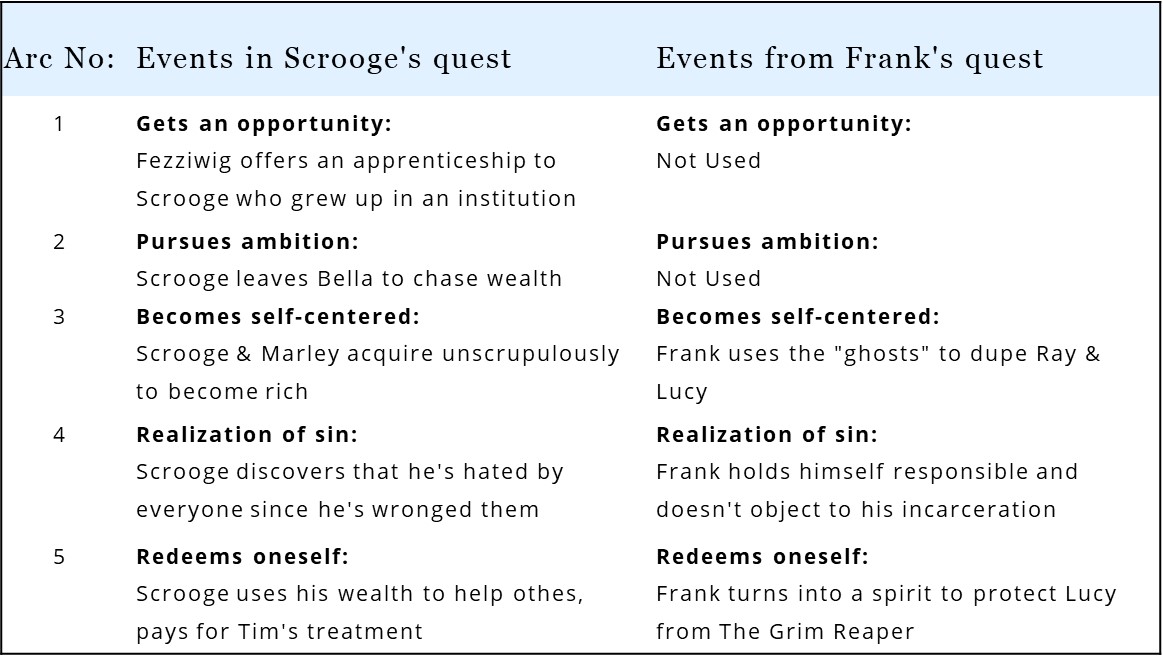
Quest 2: Lucy mirrors the universal quest for Honour
Lucy’s desire for Honour stems from the need to serve ones’ clan/ order. The tale of Hanuman from Hindu mythology is the universal quest for Honour.
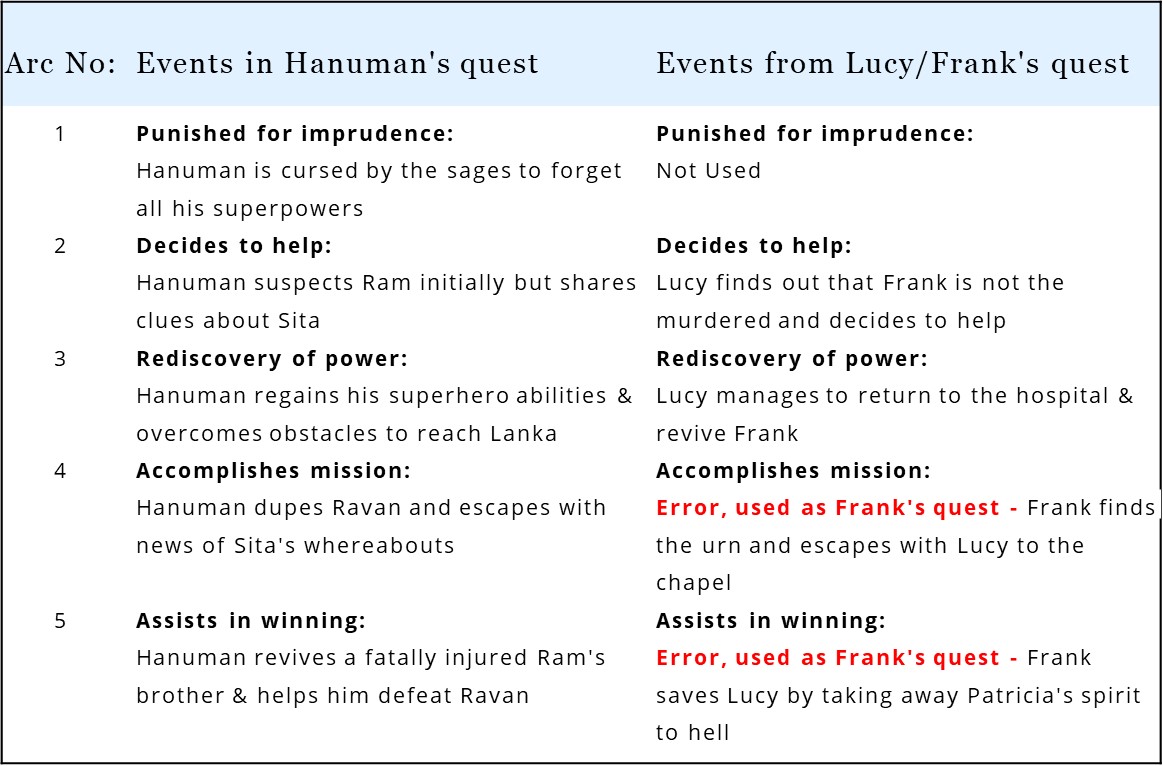
Quest 3: Johnny mirrors the universal quest for Power
Johnny’s desire for Power stems from the need to dominate others. The tale of Ravan from Hindu mythology is the universal unfulfilled quest for Power.
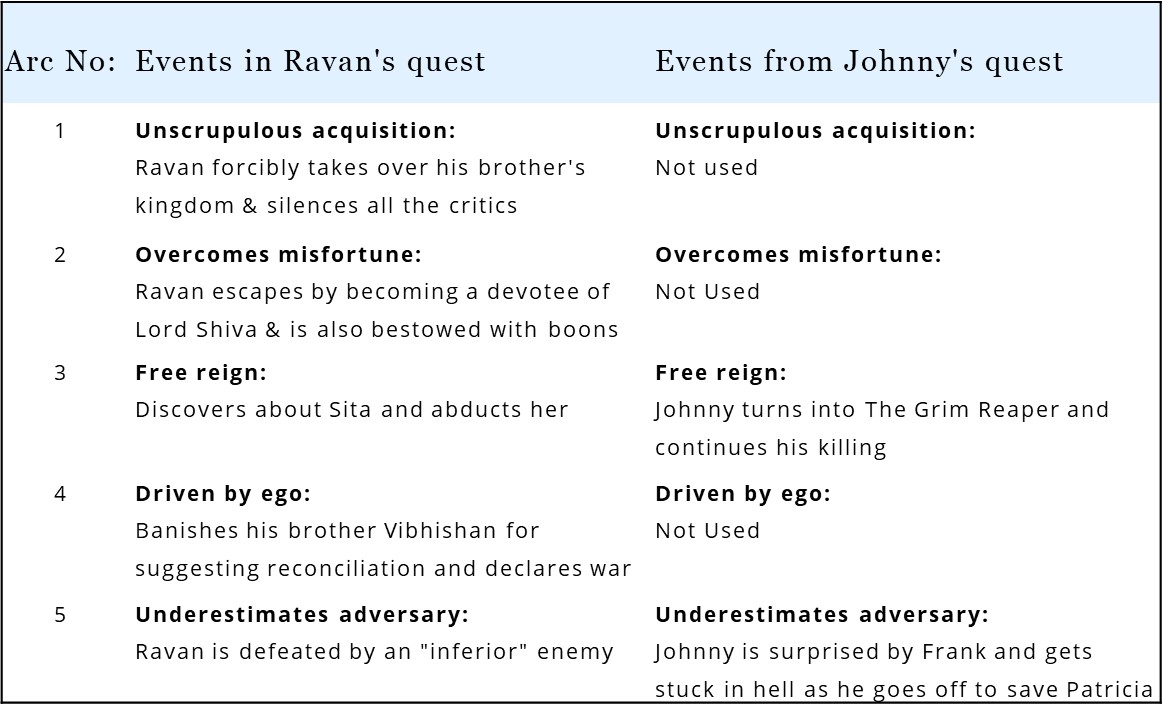
Quest 4: Patricia partially mirrors the universal quest for Power
Patricia’s desire for Power stems from the need to dominate others. The tale of Circe from Greek mythology is the universal fulfilled quest for Power.
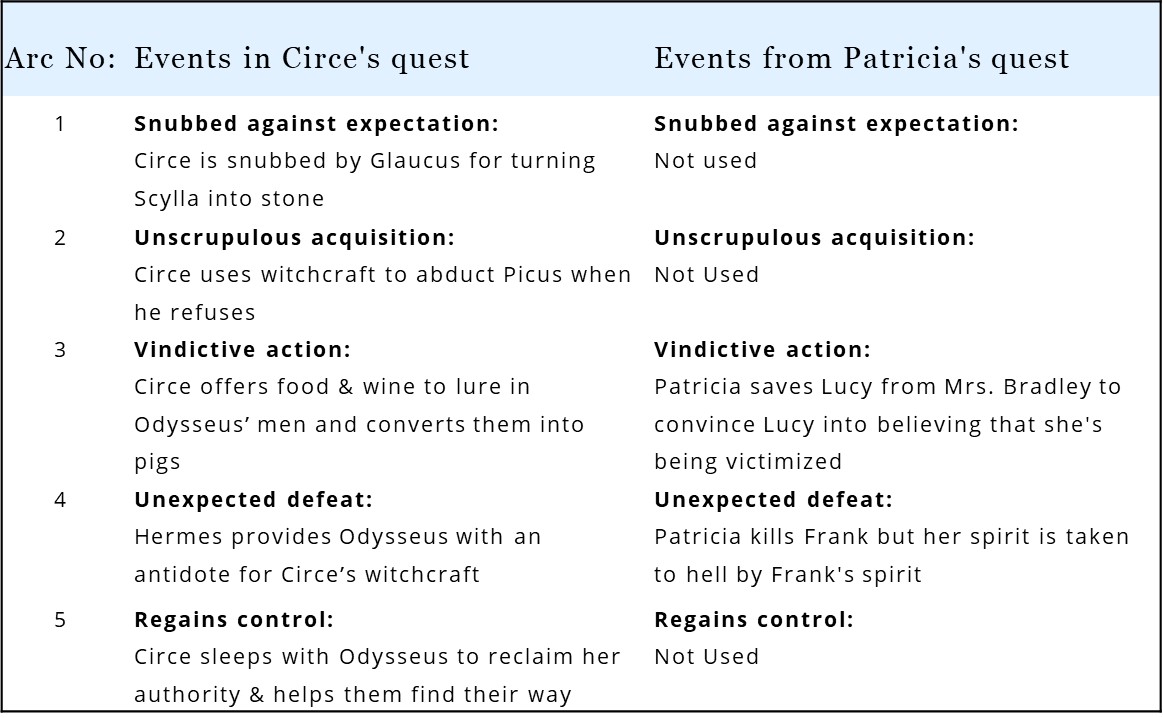
Quest 5: Dammers mirrors the universal quest for Vengeance
Dammers’s desire for Vengeance stems from the need to punish offenders. The tale of Duryodhan from Hindu mythology is the universal quest for Vengeance.
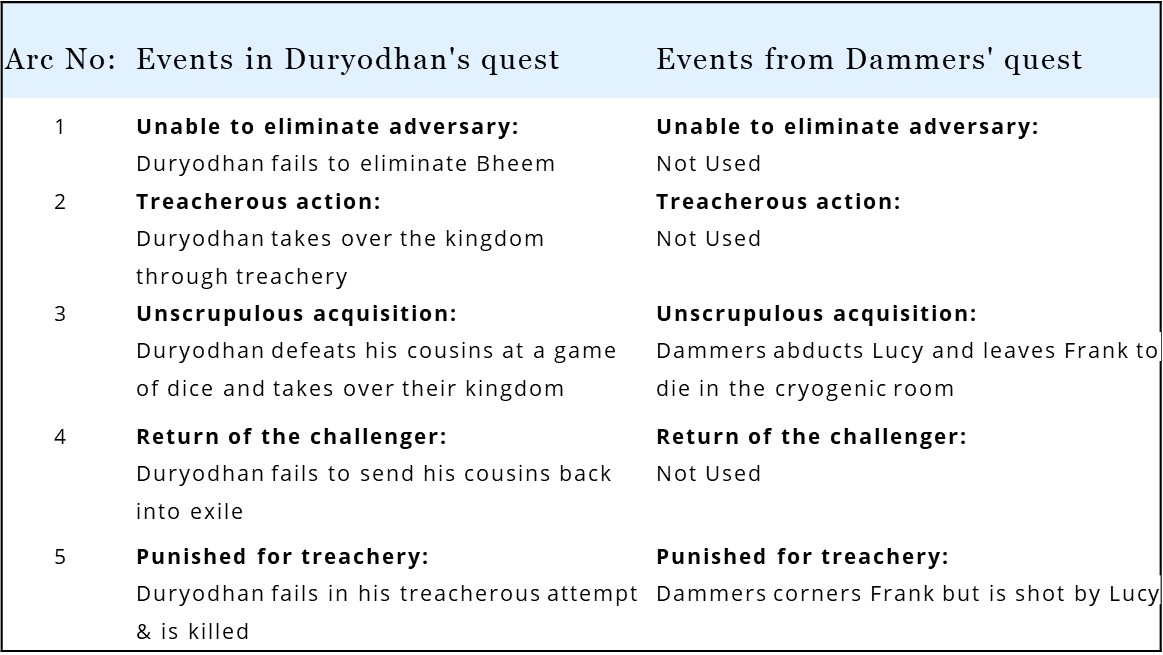
- Tags: 1996, Accumulation, Blockbuster movies, Circe, Duryodhan, Fran Walsh, Hanuman, Honour, Mythology, Peter Jackson, Plot Structure, Power, Prediction, Ravan, storytelling, Universal Pictures, Valmiki, Vengeance
